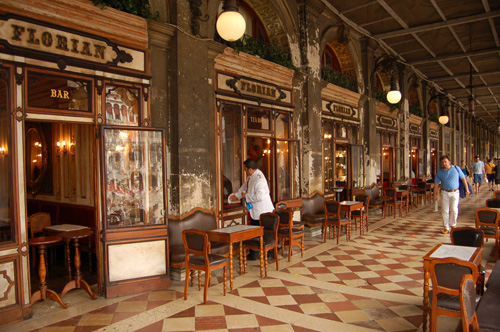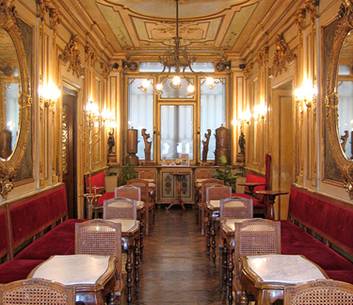

COFFEEHOUSES IN EUROPA |
| __________________________________________________________________________________________________________________________________________________________________________ |
| The New York Café in Budapest |
|
Coffeehouses were especially important to the spread of knowledge during the Enlightenment because they created a unique environment in which people from many different walks of life gathered and shared ideas. They were frequently criticized by nobles who feared the possibility of an environment in which class and its accompanying titles and privileges were disregarded. Such an environment was especially intimidating to monarchs who derived much of their power from the disparity between classes of people. If classes were to join together under the influence of Enlightenment thinking, they might recognize the all-encompassing oppression and abuses of their monarchs and, because of their size, might be able to carry out successful revolts. Monarchs also resented the idea of their subjects convening as one to discuss political matters, especially those concerning foreign affairs - rulers thought political affairs
to be their business only, a result of their supposed divine right to rule.
Coffeehouses represent a turning point in history during which people discovered that they could have enjoyable social lives within their communities. Coffeeshops became homes away from home for many who sought, for the first time, to engage in discourse with their neighbors and discuss intriguing and thought-provoking matters, especially those regarding philosophy to politics. Coffeehouses were essential to the Enlightenment, for they were centers of free-thinking and self-discovery. Although many coffeehouse patrons were scholars, a great deal were not. Coffeehouses attracted a diverse set of people, including not only the educated wealthy but also members of the bourgeoisie and the lower class. While it may seem positive that patrons, being doctors, lawyers, merchants, etc. represented almost all classes, the coffeeshop environment sparked fear in those who sought to preserve class distinction. One of the most popular critiques of the coffeehouse claimed that it "allowed promiscuous association among people from different rungs of the social ladder, from the artisan to the aristocrat" and was therefore compared to Noah's Ark, receiving all types of animals, clean or unclean. This unique culture served as a catalyst for journalism when Joseph Addison and Richard Steele recognized its potential as an audience. Together, Steele and Addison published The Spectator (1711), a daily publication which aimed, through fictional narrator Mr. Spectator, both to entertain and to provoke discussion regarding serious philosophical matters. The first English coffeehouse opened in Oxford in 1654. Brian Cowan said that Oxford coffeehouses developed into "penny universities", offering a locus of learning that was less formal than structured institutions. These penny universities occupied a significant position in Oxford academic life, as they were frequented by those consequently referred to as the "virtuosi", who conducted their research on some of the resulting premises. According to Cowan, "the coffeehouse was a place for like-minded scholars to congregate, to read, as well as learn from and to debate with each other, but was emphatically not a university institution, and the discourse there was of a far different order than any university tutorial." The Café Procope was established in Paris in 1686; by the 1720s there were around 400 cafés in the city. The Café Procope in particular became a center of Enlightenment, welcoming such celebrities as Voltaire and Rousseau. The Café Procope was where Diderot and D'Alembert decided to create the Encyclopédie. The cafés were one of the various "nerve centers" for bruits publics, public noise or rumour. These bruits were allegedly a much better source of information than were the actual newspapers available at the time. The openness probably attracted many people, they walked in and they moved off. New was also the discovery of democracy, the discussion about it, the opportunity to discuss the news of the day - all the "papers" were present. The first coffeehouses were in Mecca, Aden, Medina and Cairo and then reached Constantinople and Damascus. The first European coffeehouses were opened in Venice, followed by Oxford, London, The Hague, Hamburg, Paris, Boston, New York. Vienna, Rome, Budapest and Brussels. Coffeehouses are a place where everyone is welcome, where quality is offered and where people can experience a cosmopolitan spirit. A place for good conversation. A coffeehouse is characterized by a touch of European nostalgia. It's like you enter the Vienna of Mahler, the Lisbon Pessoa, the Paris of Proust, the Trieste Joyce. There are large mirrors on the walls, you smell the aroma of coffee, in the background plays a quiet classical music. The room exudes grandeur, class and authenticity. It's cozy, relaxed and there is a certain romance. You come there to read, write, talk and debate while enjoying Italian coffees, beverages and meals of bread, cheeses, meats, olives and more. |
 |
 |
| Examples of what is read and which is spoken, below a list of some influential books:
- war and peace, the novel by Tolstoj, war novels, books on conflict; In February 2013, three coffeehouses in Vienna opened the shelves and introduced their bookshelves filled with future literature. The project was supported with books and other materials by the Global Marshall Plan Foundation. Furthermore, the Magazin Buchkultur Wien, the Ökosoziales Forum Österreich and many private supporters donated for the roject on a Crowdfunding- platform, by material donations and by the creation of the bookshelf design by Vier zu Eins Design. Visit the shelves, take a book, drink a Wiener Melange, exchange with others and change the world! |